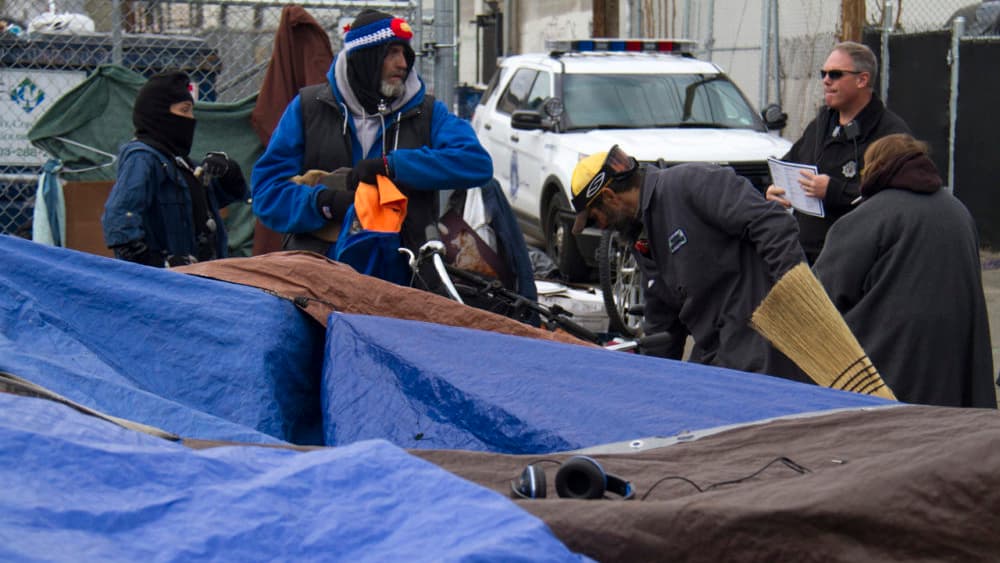Denver has settled a lawsuit over its sweeps of urban camps and agreed to pay the fees of the lawyers who represented people living in homelessness.
But after acknowledging to a federal judge Tuesday that the other side had prevailed in the class action lawsuit, a city attorney said the outcome did not mean Denver's administration "would necessarily say that it was violating rights."
Assistant City Attorney Wendy Shea appeared in a courtroom in Alfred A. Arraj United States Courthouse Tuesday where U.S. District Court Judge William Martinez asked for a briefing on the settlement, which stipulates at several points that it did not constrain the city's ability to act quickly in cases when public health and safety were threatened.
Andy McNulty, one of two attorneys for the plaintiffs, gave a quick outline in court Tuesday. The city has agreed to pay $5,000 to each of the six lead plaintiffs and unspecified attorneys fees. The city also will give a week's written notice before large-scale clearing of encampments; attach written notices to unattended personal property in areas it clears regularly and wait 48 hours before removing the items; and enact policies to ensure the return of property confiscated during clearances.
Other elements include requiring the city to provide public lockers and trash bins, portable toilets and places for needles to be discarded in parts of town frequented by people experiencing homelessness. A representative of the mayor and other city officials will hold quarterly meetings to hear from people in homelessness about whether the terms of the settlement are being upheld.
Martinez, who will have to sign off on the agreement for it to be final, asked several questions that appeared aimed at determining whether the settlement was workable. Hearing that the amount of attorneys fees had not yet been determined, Martinez turned to Shea to confirm the city agreed that they were owed to McNulty and his co-counsel Jason Flores-Williams because the plaintiffs had prevailed.
"Yes, your honor," Shea said.
She also told the judge that once the amount of attorneys fees are settled they would not need city council approval to be paid because they would instead be handed over as due because of a court ruling. Monday night, council approved paying the $30,000 total due the lead plaintiffs under the settlement.
In an interview after the hearing, Shea said the city saw the agreement as a partnership with people living in homelessness.
"There's always room to improve," she said. "We're making that improvement with the homeless community."
McNulty called the settlement a victory for people living in homelessness. He said they had been fighting for years to be treated like, for example, a businesswoman who gets a ticket for an illegally parked car instead of having the car summarily removed. The additional toilets provided under the settlement were also key, he said. As was the access to showers under a provision in the agreement that makes it easier for people living in homeless to enter municipal rec centers.
McNulty acknowledged his side has made concessions, including agreeing that Martinez would not supervise the settlement. Instead, any disputes would go to a lower court as a breach of contract case. The plaintiffs had demanded an end to jail inmates on work release being employed to clear camps, but had to settle for a promise from the city just to try to avoid that. The city also agreed to provide sensitivity training for staff who frequently encounter people living in homelessness.
"This was a compromise, certainly," McNulty said after the hearing. But "there's teeth to the settlement."
The long-running case began with group of homeless men suing over how city employees handled their belongings during a series of street clean-ups in 2016. The next year, Martinez granted it class-action status.
It is likely to be months before Martinez issues his ruling on the settlement. Members of the class -- essentially anyone living in homelessness in Denver -- must be informed and given a chance to tell Martinez what they think of it. Flores-Williams told Martinez that plans for reaching people who have no fixed address included working with the advocacy group Denver Homeless Out Loud to deploy outreach teams on the streets.
The settlement required negotiations that involved Denver Homeless Out Loud, run in part by people experiencing homelessness and a frequent opponent of the city.
Denver Homeless Out Loud got the Right to Survive initiative on the May municipal ballot. The initiative would overturn the city's camping ban by establishing a "right to rest" protected from the elements in public. It also calls for people to be able to eat and share food in public places where food is not prohibited, to shelter in legally parked motor vehicles and "to have a right and expectation of privacy and safety of or in one's person and property."
Critics say right to survive is too sweeping and that its consequences are difficult to predict.













